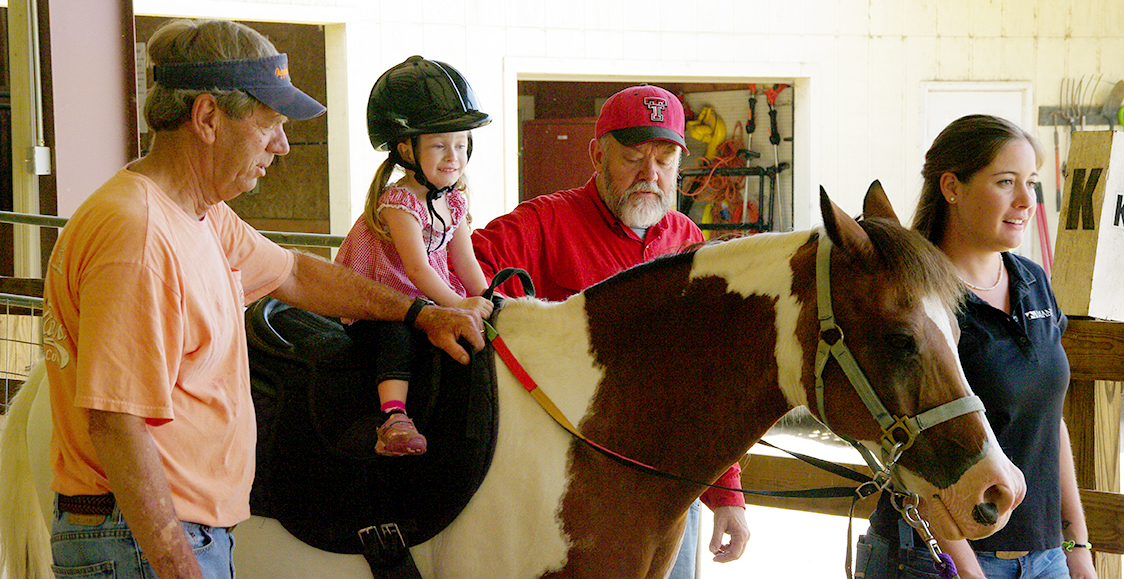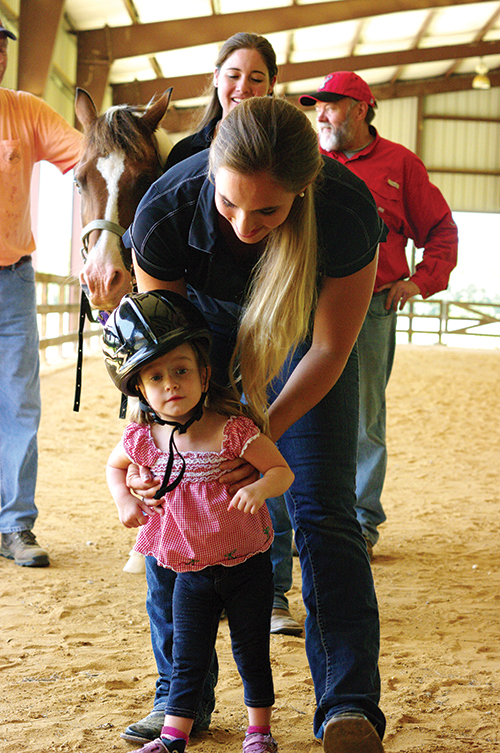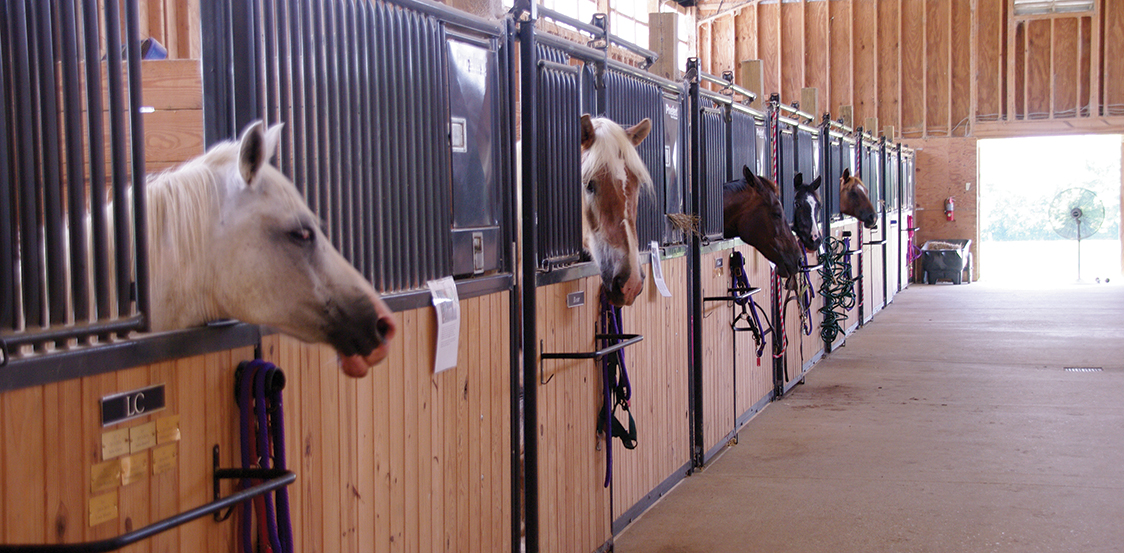
|View video of Savannah’s ride here|
Therapeutic horseback riding helps many with disabilities
By Alethia Russell
Four-year-old Savannah Dennard has a simple command for her equine friend, Spirit: “Walk on!” she chirps, and off they go as Spirit carries his tiny passenger around the covered arena at Montgomery Area Nontraditional Equestrians, or MANE. Savannah, with the help of her instructors, uses the command to maneuver the horse before being dismounted.
And although she had to be carried into the arena just 30 minutes earlier, Savannah, as volunteers hold her hands, now can use her legs to walk away from the horse.
Therapeutic horseback riding, like that provided at MANE, provides relief for people like Savannah who have cognitive, emotional, and/or physical disabilities. Therapeutic riding centers serve people of all ages and disabilities, including those with attention deficit disorder, attention deficit hyperactivity disorder, post traumatic stress disorders, cerebral palsy, obsessive compulsive disorder, and those on the autism spectrum.
Savannah is the youngest student on the roster at MANE, one of six therapeutic horseback riding centers in Alabama. After having open-heart surgery at five weeks old, Savannah was severely developmentally delayed, but her family remains confident that therapeutic horseback riding will improve her development.

Photos by. Mark Stephenson
“She’s four and she’s not walking and things like that,” says Rebecca Dennard, Savannah’s mother. “We just do everything we can to help her catch up. MANE is great for that because it’s great for her core strength, and it also gives her some independence. When you have to be carried around, that’s something you don’t always get. It’s hard when you have a child that’s so far developmentally behind, to have her play with other kids because they’re so far ahead. So this has been really great for her to hang out with people other than family.”
Dennard says Savannah has just finished her first session with MANE and is already showing physical and social progress.
Participants sometimes arrive at the center in a wheelchair, says Abby Houchin, volunteer coordinator at MANE, but after riding on the horses, they are able to walk out because the motion of the horse gives them more flexibility.
“There are physical benefits,” Houchin says. “The motion of a horse mimics the walking motion. So often, for people who have lower limb issues, we walk with them after they ride.”
The physical benefits range from quickening of reflexes, better motor planning, muscle strengthening, and reduction of abnormal movements and spasticity. Gerry Rodgers PT, PCS, a physical therapist at Children’s Rehab Services, says one of the reasons he refers patients to therapeutic riding is because it is beneficial and fun.
“When something is fun, it makes it more therapeutic,” Rodgers says. “You’re more likely to do it and be more engaged. From a therapeutic point of view, if something is more engaging, people are more likely to do it and benefit in the long run. As therapists, we can come up with exercises that may be good for them. You may be doing the same stretching activities and moving activities as in a therapy session, but you’re doing it for a purpose and not just to do it. You do it to stay on the horse, because it’s fun, or because you’re outside and that makes it so much more effective.“
The healing touch of horses
Not only does therapeutic horseback riding benefit the body, but it also benefits the mind. Patricia Thorn owns SpiritHorse Therapeutic Riding Center at the Mercy Seat in Prattville, and she began her work in therapeutic horseback riding after experiencing a death in her family. She says her love of horses helped her through it.
“Horses have such a healing touch,” Thorn says. “I believe people are starting to see the prosperity and possibilities for children to have an outlet in this that they may not have had before. It gives them a sense of pride. It gives them the ability to call something their own that’s a sport, and something to brag about because many of them can’t play a sport or join a team. It gives them a recreation beyond the therapy itself. It’s very unique because you’re developing a bond between the horse with yourself, the volunteers, and staff in multiple ways.”
Each center has unique programs staffed with trained instructors certified by SpiritHorse or Professional Association of Therapeutic Horsemanship, International (PATH). The therapeutic horseback riding centers in Alabama are all non-profit organizations, and rely heavily on volunteers, sponsors, grants and donations to operate. Monetary donations, grants and donations of equipment keep the many programs offered at MANE functioning during their three sessions year-round.
“Most of our income does not come from tuition,” Houchin says. “A lot of our riders are on scholarship, so I would say about 88 percent of our funds are from grants or private donations. With 44 acres and two full-time employees, there are not enough of us to do everything that needs to be done every day. We rely heavily on the volunteers that we have. We have almost 60 active volunteers now. That doesn’t even count the special volunteer workdays that a church or big group wants to help with and we’ll have a big project for them to do in one day.”

Volunteers always needed
Chandalyn Chrzanowski, equine director at MANE, and Thorn say they always need volunteers and can never have too many. Thorn says her center needs more adult volunteers, especially after school when the fall session starts. She hopes her center can serve more people as a year-round facility, with the addition of a new parking lot and a covered arena on her wish list.
The goals of participants like Savannah could become more reachable. For Savannah, “walk on” will one day not just be a command in her riding lesson; it will be something she can do on her own.
“The biggest thing we’ve seen is that she’s asking for what she wants. She’s communicating better,” Dennard said. “Her physical therapist has commented that through the legs and the trunk and torso that she’s really developing those muscles and making them stronger. It’s been really great for her confidence too, that she’s been able to ask for things and she tries to walk more and she doesn’t fight so much when you try to take her up the stairs.”
For more information on therapeutic horseback riding centers in Alabama, visit their websites:
- Special Equestrians
specialequest.org
1215 Woodward Drive
Indian Springs, Alabama 35124
205-987-9462 - Equines Assisting Special Individuals
easitrc.org
242 Summerville Road, Jasper, AL 35504
205-387-7486 - Marianna Greene Henry Special Equestrians Program
mgharena.com
29401 AL Hwy. 21 South
Talladega, AL 35160
256-761-3364 - Montgomery Area Nontraditional Equestrians (MANE)
maneweb.org
3699 Wallahatchie Road
Pike Road AL 36064
334-213-0909 - SpiritHorse Therapeutic Riding Center at the Mercy Seat
spirithorsetrc.org
1962 Suncrest Drive
Prattville, Alabama 36067
334-531-7019 - Horses Offering People Encouragement (HOPE)
hopehorses.org
1301 Convent Road NE
Cullman, Alabama 35055
256-841-6290




